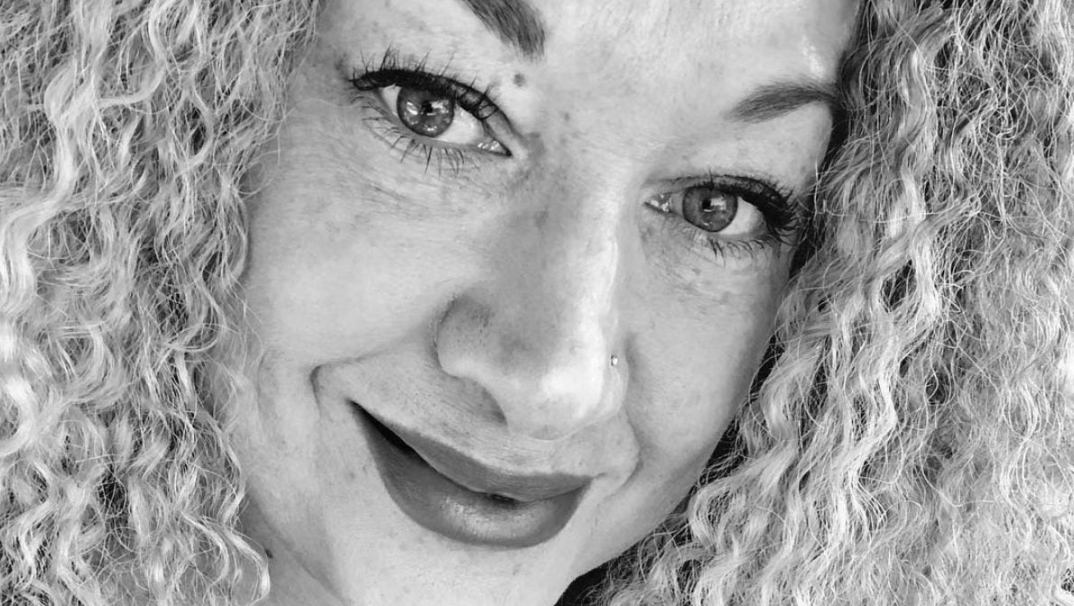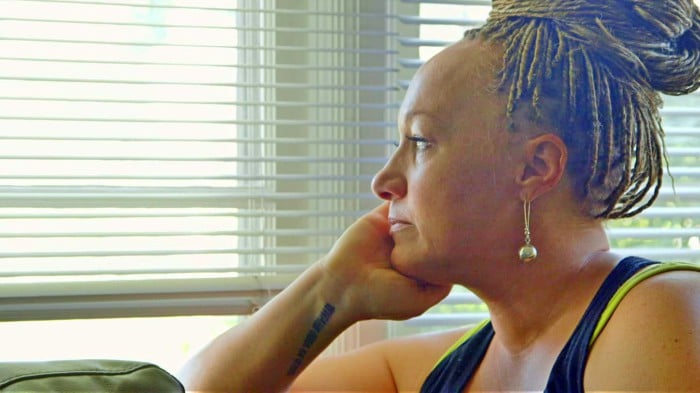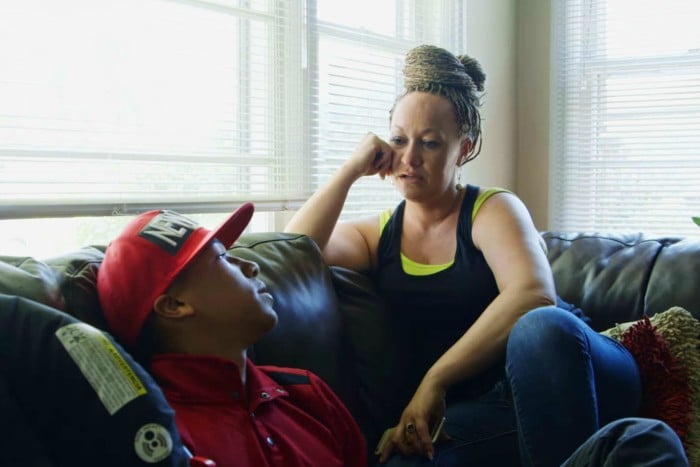10 off-the-chain moments from Netflix’s ‘The Rachel Divide’ about ‘transracial’ princess Rachel Dolezal
A list of thought-provoking facts from the new documentary.
An intimate look at Dolezal shortly after her most tumultuous moments and her difficult process of self-identification.

Netflix’s latest documentary, The Rachel Divide, is sure to pose more questions than answers about its controversial subject, Rachel Dolezal.
Despite the remaining ambiguities and conflicting viewpoints highlighted in the doc, the film did manage to shed light on certain facts about Dolezal’s weird but interestingly true story that weren’t made clear before.
In case you don’t get to it, we went there for you. Here are 10 things we were surprised to learn from our ride on the crazy-train:
1. She feels framed. Even now, three years after the scandal rocked the nation, Dolezal feels like she was “framed” as a liar. She doesn’t get that she IS a liar for perpetuating herself as a Black woman. Her futile attempts at semantics, such as saying she’s “Black” but not African-American are used as a way to explain away the difference between her biological ethnicity and the socially constructed culture she uses as part of her identity. Despite her best efforts, her river of white tears are still no excuse for the years-long appropriation tour.
2. She was raised by monsters. While I have trouble accepting many of Dolezal’s assertions, the documentary did illuminate just how treacherous her parents were to her. Larry and Ruthann Dolezal are described in the doc as freakishly religious extremists who took discipline to harrowing extremes.
The couple adopted Esther, a Black woman who is now in her early 20s, when she was three months old, according to People magazine. The scars left on Esther’s body from being beaten with a baboon whip (is that a thing?) and spanked with glue sticks are impossible to ignore. The film professes that the couple had a desire to adopt Black babies because they were cheaper and quicker, which speaks to their evil nature. The fact that Esther says she and her siblings were raised as “white kids with skin conditions” is troubling AF.
3. Her charade may be a response to trauma. Rachel Dolezal comes across as a deeply damaged person. Whether she used blackness as a way to detach from the twisted realities of her childhood and as an escape from her abuse is worth considering. She’s not the first abused kid who survived by creating “alternative facts.” Perhaps, it was easier to imagine that she was “kidnapped” than to accept that her parents would inflict such harm to their own child.
Remember when you figured out you were Black? It wasn’t because you felt different. It’s because you were treated differently. Such is the case with child abuse and being born into a family that doesn’t love you, appreciates you or makes you feel like you’re a problem for breathing. The same can be true about being born into a country that hates you for no reason?
4. Her deep connection to her Black siblings. Dolezal’s love for her kids and siblings is hard to deny. It’s clear they feel she rescued them from their adoptive parents and they love her for it. Whether she used her relationship with them to excuse her behavior remains in question, but at the end of the day, they believe they are better off with her than with the psychopaths who “saved them from abortion.”

Rachel Dolezal featured in her new Netflix documentary, The Rachel Divide.
5. Ulterior motives. Dolezal wasn’t outed to fix an injustice. Her parents weren’t motivated by a need to inform the masses of her devious schemes. What we learned is that they were motivated by their need to discredit a witness who had the potential to send their beloved son, who was being accused of molesting his siblings, to prison. A private investigator, who was hired by the family to dig up dirt on Dolezal,was the person responsible for tipping off the local news station about her charade.
Another interesting fact highlighted by the film is the fact that leaders in Spokane were motivated by the need to cover up deep-rooted racial tensions that continue to permeate the city. A number of local journalists interviewed in the documentary assert that even if some of Dolezal’s claims of racism were exaggerated, they were certainly possible given the community’s tense racial climate.
6. Fresh wounds. We may have underestimated the degree of hatred the public continues to exhibit for this woman. Social media posts from trolls who describe the disgusting things they want to do to her newborn son are disturbing, no matter how you feel about his mother. Watching her kids struggle through life is also a tough pill to swallow and makes us wonder if the punishment of permanent ridicule fits the crime of being mentally unhinged on a pubic platform. The boys can’t even get a haircut at the barber shop without someone yelling at their mother or flipping them off on the road.

Rachel Dolezal and her son are featured in her new Netflix documentary, The Rachel Divide.
7. Can you buy the “Transracial” idea? The notion that someone can transcend their race and adopt a different culture based on how they “feel” has been widely rejected, particularly by the transgender community, but the doc opens the door for further examination. Dolezal argues that people should be allowed to “live how they feel” and she gets some support from other figures who see the similarities between her plight and that of transgender people who say their internal biology has nothing to do with who they really are. The “I was born with a penis but I’m a woman inside” argument doesn’t sound much different form her assertion that she was “born white but feels Black.”
Race as a social construct isn’t a novel idea, but Rachel Dolezal is NOT the person who should shepherd us into this dialogue.
8. She’s broke. The few times I have allowed my mind to wander over to Rachel-land, I imagined her sitting on top of a stack of money, responding to email requests and stacking coins that came from her book deal. I pictured her cackling at her haters as she flipped her long braids over one shoulder and relished the fact that she’s a bad ass Black woman.
Well, it turns out, none of that is true. Dolezal has not been able to secure work as a professor in African-American studies and the NAACP chapter she once worked for wants nothing to do with her. She’s virtually unemployable, aside from her in-home hair salon. She thinks its because companies and schools are fearful of backlash. In reality, it’s probably more likely due to her deceptive behavior and total lack of credibility.
9. She’s not sorry. Dolezal doesn’t give a damn. She’s not sorry for what she has done. She takes no responsibility for her actions and instead blames her parents, the media, the public’s unwillingness to understand her for all the problems she faces and created. Her abusers range from her biological parents to Spokane reporters and police, to her baby daddys. In her mind, she’s the ultimate victim.
While recounting details about her romantic relationships, she casts herself in the role of the “survivor” instead of a willing participant. This speaks volumes to the depths of her delusions and her inability to recognize her hand in hurting so many people while damaging the causes she claims to champion so vehemently.
10. She’s committed to her crazy. Just when we think Rachel Dolezal may have swallowed a reality pill when she starts cutting off her braids, we realize that no, she’s just prepping her scalp for a brand new sew in before she heads to the court house to change her name to Nkeche Amare Diallo.
The Rachel Divide documentary, which premiered at the Tribeca Film Festival, debuts on April 27.
